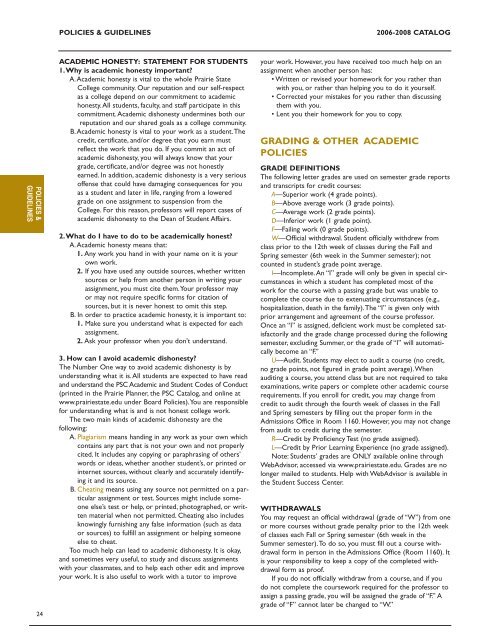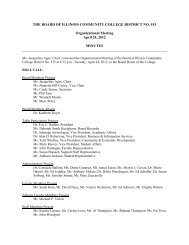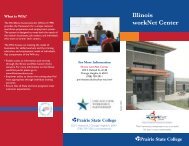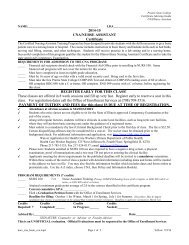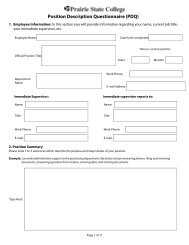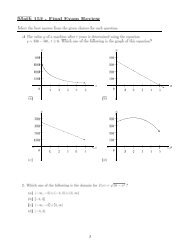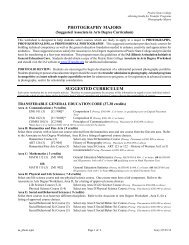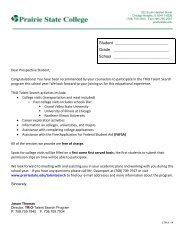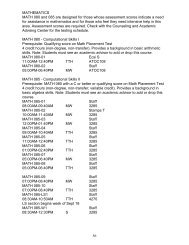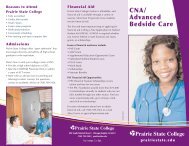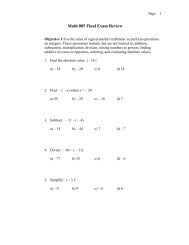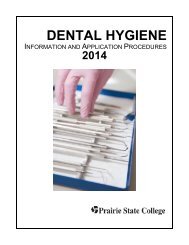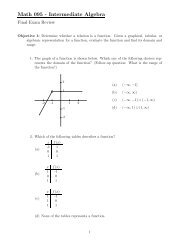POLICIES & GUIDELINES2006-2008 CATALOGPOLICIES &GUIDELINES24ACADEMIC HONESTY: STATEMENT FOR STUDENTS1.Why is academic honesty important?A.Academic honesty is vital to the whole <strong>Prairie</strong> <strong>State</strong><strong>College</strong> community. Our reputation and our self-respectas a college depend on our commitment to academichonesty.All students, faculty, and staff participate in thiscommitment.Academic dishonesty undermines both ourreputation and our shared goals as a college community.B.Academic honesty is vital to your work as a student.Thecredit, certificate, and/or degree that you earn mustreflect the work that you do. If you commit an act ofacademic dishonesty, you will always know that yourgrade, certificate, and/or degree was not honestlyearned. In addition, academic dishonesty is a very seriousoffense that could have damaging consequences for youas a student and later in life, ranging from a loweredgrade on one assignment to suspension from the<strong>College</strong>. For this reason, professors will report cases ofacademic dishonesty to the Dean of Student Affairs.2.What do I have to do to be academically honest?A.Academic honesty means that:1. Any work you hand in with your name on it is yourown work.2. If you have used any outside sources, whether writtensources or help from another person in writing yourassignment, you must cite them.Your professor mayor may not require specific forms for citation ofsources, but it is never honest to omit this step.B. In order to practice academic honesty, it is important to:1. Make sure you understand what is expected for eachassignment.2. Ask your professor when you don't understand.3. How can I avoid academic dishonesty?The Number One way to avoid academic dishonesty is byunderstanding what it is.All students are expected to have readand understand the PSC Academic and Student Codes of Conduct(printed in the <strong>Prairie</strong> Planner, the PSC Catalog, and online atwww.prairiestate.edu under Board Policies).You are responsiblefor understanding what is and is not honest college work.The two main kinds of academic dishonesty are thefollowing:A. Plagiarism means handing in any work as your own whichcontains any part that is not your own and not properlycited. It includes any copying or paraphrasing of others'words or ideas, whether another student’s, or printed orinternet sources, without clearly and accurately identifyingit and its source.B. Cheating means using any source not permitted on a particularassignment or test. Sources might include someoneelse’s test or help, or printed, photographed, or writtenmaterial when not permitted. Cheating also includesknowingly furnishing any false information (such as dataor sources) to fulfill an assignment or helping someoneelse to cheat.Too much help can lead to academic dishonesty. It is okay,and sometimes very useful, to study and discuss assignmentswith your classmates, and to help each other edit and improveyour work. It is also useful to work with a tutor to improveyour work. However, you have received too much help on anassignment when another person has:• Written or revised your homework for you rather thanwith you, or rather than helping you to do it yourself.• Corrected your mistakes for you rather than discussingthem with you.• Lent you their homework for you to copy.GRADING & OTHER ACADEMICPOLICIESGRADE DEFINITIONSThe following letter grades are used on semester grade reportsand transcripts for credit courses:A—Superior work (4 grade points).B—Above average work (3 grade points).C—Average work (2 grade points).D—Inferior work (1 grade point).F—Failing work (0 grade points).W—Official withdrawal. Student officially withdrew fromclass prior to the 12th week of classes during the Fall andSpring semester (6th week in the Summer semester); notcounted in student’s grade point average.I—Incomplete.An “I” grade will only be given in special circumstancesin which a student has completed most of thework for the course with a passing grade but was unable tocomplete the course due to extenuating circumstances (e.g.,hospitalization, death in the family).The “I” is given only withprior arrangement and agreement of the course professor.Once an “I” is assigned, deficient work must be completed satisfactorilyand the grade change processed during the followingsemester, excluding Summer, or the grade of “I” will automaticallybecome an “F.”U—Audit. Students may elect to audit a course (no credit,no grade points, not figured in grade point average).Whenauditing a course, you attend class but are not required to takeexaminations, write papers or complete other academic courserequirements. If you enroll for credit, you may change fromcredit to audit through the fourth week of classes in the Falland Spring semesters by filling out the proper form in theAdmissions Office in Room 1160. However, you may not changefrom audit to credit during the semester.R—Credit by Proficiency Test (no grade assigned).L—Credit by Prior Learning Experience (no grade assigned).Note: Students’ grades are ONLY available online throughWebAdvisor, accessed via www.prairiestate.edu. Grades are nolonger mailed to students. Help with WebAdvisor is available inthe Student Success Center.WITHDRAWALSYou may request an official withdrawal (grade of “W”) from oneor more courses without grade penalty prior to the 12th weekof classes each Fall or Spring semester (6th week in theSummer semester).To do so, you must fill out a course withdrawalform in person in the Admissions Office (Room 1160). Itis your responsibility to keep a copy of the completed withdrawalform as proof.If you do not officially withdraw from a course, and if youdo not complete the coursework required for the professor toassign a passing grade, you will be assigned the grade of “F.” Agrade of “F” cannot later be changed to “W.”
2006-2008 CATALOGPOLICIES & GUIDELINESCALCULATING GRADE POINT AVERAGEEach academic term, the college calculates two grade pointaverages for a student. First, your semester’s grades will becombined in the term GPA.This includes all courses graded onthe A-F basis as outlined in the section above. Second, the<strong>College</strong> calculates your cumulative GPA (CGPA).This calculationincludes only those courses numbered 100 and above andexcludes developmental courses, since they do not counttoward meeting degree or certificate requirements.All academichonors and decisions about academic standing are based onyour cumulative GPA.A student’s cumulative GPA is calculatedby using total grade points divided by total credit hoursattempted.For the purpose of your official transcript, honors at graduation,and the President’s and Part-Time Honors Lists, the GPAcalculation will not include developmental courses. For the purposesof Illinois Veteran Grants, financial aid, and Standards ofAcademic Progress, the GPA calculation will include developmentalcourses.GRADE APPEAL PROCESSInformation about the grade appeal process may be obtainedfrom the office of the appropriate dean. Students may notappeal a grade for an individual assignment or examination in acourse. Only the final course grade may be appealed.PROBATION AND DISMISSALThis policy is designed to encourage academic excellence andprovide assistance in improving a student’s performance if necessary.At the end of each term, if you have a cumulative gradepoint average of less than 2.0 (“C”) after completing nine ormore credit hours, you will be placed on Academic Probation.You may also be placed on Academic Probation or dismissedfor unsatisfactory attendance, unacceptable scholarship, orunacceptable conduct as specified in the <strong>College</strong> Policies andProcedures Manual and the Student Handbook.Once you are placed on Academic Probation, you will begiven the next two semesters of enrollment to raise yourcumulative grade point average to at least 2.0 (“C”). Failure todo so will jeopardize your continued enrollment at the <strong>College</strong>.Students placed on Academic Probation will be notifiedthrough a letter from the <strong>College</strong> that explains your status andspells out assistance that is available to you to help youimprove your academic performance. If you fail to earn the necessary2.0 (“C”) cumulative GPA at the end of the probationaryperiod, you will be subject to Academic Dismissal. Copies of thecomplete policies are available in the Admissions Office.Typically, students placed on Academic Dismissal will maintainthis status for at least one term. However, those studentswhose cumulative GPA has shown significant and substantialimprovement during their probationary period, or those whohave already been away from their studies for at least oneterm, may file a written petition for readmission to the Dean ofAcademic Services & Counseling.Those readmitted to PSCunder such circumstances return on Academic Probation andare given the next semester to reach “good standing.”ACADEMIC FORGIVENESSThe <strong>College</strong> allows students to make up for poor past academicperformance on a credit-hour by credit-hour basis.After aperiod of five years of non-enrollment at PSC, you may usegrades earned in more recent course work to obtain gradepoint average relief for past academic performance.You may use the academic forgiveness policy only once duringyour tenure at PSC. Note that while this policy provides amechanism for deleting grades from grade point average calculations,all grades, including those forgiven, will continue toappear on your academic transcript. For details, contact anenrollment advisor at (708) 709-3506.COURSE REPEAT POLICYIf you receive a grade less than “C,” you can retake that class inorder to increase your learning and earn a higher grade. In suchcases, all completed courses and earned grades will appear onyour transcript; however, the later grade for a particular coursewill be the only one used to calculate your cumulative gradepoint average. If you retake a course for which you received agrade lower than a “C,” you may do so only once at the regulartuition rate. For more than one retake, you must pay tuitionplus a course repeat fee.This policy only applies to courses thatare not designated for multiple enrollments. Courses deemedby the state to be repeatable (such as Aerobics, Private MusicLessons) may be taken up to four times at regular tuitioncharges.ACADEMIC HONORSEach Fall and Spring, students who have demonstrated high academicachievement will be recognized in one of the followingways:• Dean’s List: To be eligible for this recognition, a studentmust be “in good standing” and have (1) completed a minimumof twelve (12) credit hours in the semester; (2) earned asemester GPA of 3.75 or better; (3) maintained a cumulativeGPA of 3.5 (“B+”) or better; and (4) completed a minimum oftwelve (12) credit hours at <strong>Prairie</strong> <strong>State</strong> <strong>College</strong> (excludingcourses transferred in to PSC).• Part-Time Honors List: To be eligible for this recognition, apart-time student must be “in good standing” and have (1)earned a semester GPA of 3.75 or better; (2) maintained acumulative GPA of 3.5 (“B+”) or better; and (3) completed aminimum of twelve (12) credit hours at <strong>Prairie</strong> <strong>State</strong> <strong>College</strong>(excluding courses transferred in to PSC).Other honors that the college offers include TrusteeScholars (for high school seniors), Phi Theta Kappa (communitycollege honor society), the Honors Program (honors credit forsome courses) as well as three categories of GraduationHonors: Cum Laude (3.30-3.64 GPA); Magna Cum Laude(3.65-3.84 GPA); and Summa Cum Laude (3.85-4.0 GPA).Additional information about these honors is available by callingthe Office of the Vice President of Student Affairs at(708) 709-3507.POLICIES &GUIDELINES25
- Page 1 and 2: A comprehensive community college20
- Page 3 and 4: 2006-2008 CATALOGIllinois Community
- Page 5 and 6: 2006-2008 CATALOGCONTENTSOVERVIEW:
- Page 7 and 8: 2006-2008 CATALOGOVERVIEWGETTING AC
- Page 9 and 10: 2006-2008 CATALOGOVERVIEWASSOCIATE
- Page 11 and 12: 2006-2008 CATALOGOVERVIEWIllinois E
- Page 13 and 14: 2006-2008 CATALOGENROLLMENTSTARTING
- Page 15 and 16: 2006-2008 CATALOGENROLLMENT7. Pay t
- Page 17 and 18: 2006-2008 CATALOGENROLLMENTSPECIAL
- Page 19 and 20: 2006-2008 CATALOGPOLICIES & GUIDELI
- Page 21 and 22: 2006-2008 CATALOGPOLICIES & GUIDELI
- Page 23 and 24: 2006-2008 CATALOGPOLICIES & GUIDELI
- Page 25: 2006-2008 CATALOGPOLICIES & GUIDELI
- Page 29 and 30: 2006-2008 CATALOGSTUDENT SERVICESFI
- Page 31 and 32: 2006-2008 CATALOGSTUDENT SERVICESFI
- Page 33 and 34: 2006-2008 CATALOGSTUDENT SERVICESOT
- Page 35 and 36: 2006-2008 CATALOGSTUDENT LIFEEXPERI
- Page 37 and 38: 2006-2008 CATALOGSTUDENT LIFENORTH
- Page 39 and 40: 2006-2008 CATALOGSTUDENT LIFECULTUR
- Page 41 and 42: 2006-2008 CATALOGDEGREES, CERTIFICA
- Page 43 and 44: 2006-2008 CATALOGILLINOIS ARTICULAT
- Page 45 and 46: 2006-2008 CATALOGFine Arts CoursesA
- Page 47 and 48: 2006-2008 CATALOGDEGREES, CERTIFICA
- Page 49 and 50: 2006-2008 CATALOGDEGREES, CERTIFICA
- Page 51 and 52: 2006-2008 CATALOGBUSINESSA.A. Degre
- Page 53 and 54: 2006-2008 CATALOGCOMPUTER SCIENCEA.
- Page 55 and 56: 2006-2008 CATALOGEARTH SCIENCE/GEOL
- Page 57 and 58: 2006-2008 CATALOGDEGREES, CERTIFICA
- Page 59 and 60: 2006-2008 CATALOGGENERAL MATH/SCIEN
- Page 61 and 62: 2006-2008 CATALOGLIBERAL ARTSA.A. D
- Page 63 and 64: 2006-2008 CATALOGPRE-MEDICINEA.S. D
- Page 65 and 66: 2006-2008 CATALOGPRE-OCCUPATIONAL T
- Page 67 and 68: 2006-2008 CATALOGPRE-PHYSICAL THERA
- Page 69 and 70: 2006-2008 CATALOGSOCIAL WORKA.A. De
- Page 71 and 72: 2006-2008 CATALOGDEGREES, CERTIFICA
- Page 73 and 74: 2006-2008 CATALOGCAREER PROGRAMSThe
- Page 75 and 76: 2006-2008 CATALOGAUTOMOTIVE ALIGNME
- Page 77 and 78:
2006-2008 CATALOGDEGREES, CERTIFICA
- Page 79 and 80:
2006-2008 CATALOGDEGREES, CERTIFICA
- Page 81 and 82:
2006-2008 CATALOGDEGREES, CERTIFICA
- Page 83 and 84:
2006-2008 CATALOGDEGREES, CERTIFICA
- Page 85 and 86:
2006-2008 CATALOGDEGREES, CERTIFICA
- Page 87 and 88:
2006-2008 CATALOGDEGREES, CERTIFICA
- Page 89 and 90:
2006-2008 CATALOGDEGREES, CERTIFICA
- Page 91 and 92:
2006-2008 CATALOGDEGREES, CERTIFICA
- Page 93 and 94:
2006-2008 CATALOGNURSINGContinuedNU
- Page 95 and 96:
2006-2008 CATALOGINDUSTRIAL ELECTRI
- Page 97 and 98:
2006-2008 CATALOGMANUFACTURING TECH
- Page 99 and 100:
2006-2008 CATALOGINFORMATION TECHNO
- Page 101 and 102:
2006-2008 CATALOGCOMPUTER REPAIR SP
- Page 103 and 104:
2006-2008 CATALOGSPREADSHEET - PROF
- Page 105 and 106:
2006-2008 CATALOGDEGREES, CERTIFICA
- Page 107 and 108:
2006-2008 CATALOGDEGREES, CERTIFICA
- Page 109 and 110:
2006-2008 CATALOGILLINOIS ARTICULAT
- Page 111 and 112:
2006-2008 CATALOGART 126 (IAI: F2 9
- Page 113 and 114:
2006-2008 CATALOGAUTO 214COLLISION
- Page 115 and 116:
2006-2008 CATALOGBIOL 225FUNCTIONAL
- Page 117 and 118:
2006-2008 CATALOGBUS 169MATERIALS H
- Page 119 and 120:
2006-2008 CATALOGBUS 270INTERNATION
- Page 121 and 122:
2006-2008 CATALOGCHEM 203 (IAI: BIO
- Page 123 and 124:
2006-2008 CATALOGCET 114DIGITAL FUN
- Page 125 and 126:
2006-2008 CATALOGDH 108CLINICAL DEN
- Page 127 and 128:
2006-2008 CATALOGEARLY CHILDHOOD ED
- Page 129 and 130:
2006-2008 CATALOGED 220CHILDREN’S
- Page 131 and 132:
2006-2008 CATALOGEMS 230PARAMEDICIN
- Page 133 and 134:
2006-2008 CATALOGENG 241CONTEMPORAR
- Page 135 and 136:
2006-2008 CATALOGFST 213FIRE SERVIC
- Page 137 and 138:
2006-2008 CATALOGGC 185DIGITAL SOUN
- Page 139 and 140:
2006-2008 CATALOGHIST 112 (IAI: S2
- Page 141 and 142:
2006-2008 CATALOGAPPIE 106DC MOTORS
- Page 143 and 144:
2006-2008 CATALOGAPPIE 290SPECIAL T
- Page 145 and 146:
2006-2008 CATALOGNETWORKING - ITNET
- Page 147 and 148:
2006-2008 CATALOGITPRG 141INTRODUCT
- Page 149 and 150:
2006-2008 CATALOGITWEB 220INTERNET
- Page 151 and 152:
2006-2008 CATALOGMAINTENANCE TECHNI
- Page 153 and 154:
2006-2008 CATALOGMATH 096GEOMETRYPr
- Page 155 and 156:
2006-2008 CATALOGMILLWRIGHT - APPRE
- Page 157 and 158:
2006-2008 CATALOGMUSIC 152 (IAI: MU
- Page 159 and 160:
2006-2008 CATALOGNURS 103TRANSITION
- Page 161 and 162:
2006-2008 CATALOGPHOTO 282EXPERIMEN
- Page 163 and 164:
2006-2008 CATALOGPE 163GOLFPrerequi
- Page 165 and 166:
2006-2008 CATALOGPLUMBING, PIPEFITT
- Page 167 and 168:
2006-2008 CATALOGREGISTERED NURSING
- Page 169 and 170:
2006-2008 CATALOGSRT 298SURGICAL TE
- Page 171 and 172:
2006-2008 CATALOGWELDER - APPRENTIC
- Page 173 and 174:
2006-2008 CATALOGGRADUATION & TRANS
- Page 175 and 176:
2006-2008 CATALOGGRADUATION & TRANS
- Page 177 and 178:
2006-2008 CATALOGDIRECTORYMEETING O
- Page 179 and 180:
2006-2008 CATALOGEXECUTIVE OFFICERS
- Page 181 and 182:
2006-2008 CATALOGDIRECTORYFACULTYFA
- Page 183 and 184:
2006-2008 CATALOGProfessor John Lim
- Page 185 and 186:
2006-2008 CATALOGCheryl Bland-Winbu
- Page 187 and 188:
2006-2008 CATALOGDIRECTORYSUPPORT S
- Page 189 and 190:
2006-2008 CATALOGDIRECTORYSUPPORT S
- Page 191 and 192:
2006-2008 CATALOGINDEXCollege Bowl
- Page 193 and 194:
2006-2008 CATALOGINDEXpre-Manufactu


